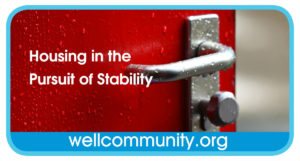 So often, the challenges of housing insecurity and the struggles of living with mental illness compound one another. The daily issues faced by those without stable housing situations make it difficult for them to pursue mental health stability; likewise, dealing with a mental health condition can impede their ability to take steps toward more stable living conditions. Housing is truly a foundational issue in addressing the difficulties faced by those living with serious mental illnesses.
So often, the challenges of housing insecurity and the struggles of living with mental illness compound one another. The daily issues faced by those without stable housing situations make it difficult for them to pursue mental health stability; likewise, dealing with a mental health condition can impede their ability to take steps toward more stable living conditions. Housing is truly a foundational issue in addressing the difficulties faced by those living with serious mental illnesses.
Many of the living situations in which those suffering from mental health challenges find themselves further erode their wellbeing. While it’s relatively common to hear about the ways homelessness can negatively impact mental health, living in an unstable or unsafe environment can also drastically hinder a person’s ability to manage any kind of health condition, mental illnesses included. For example, lacking a permanent address can make it difficult and often impossible to obtain a state-issued photo ID needed to gain access to critical services; and frequent changes in location make finding transportation to doctor’s appointments more challenging. In addition, the stress of living in a place that doesn’t feel secure robs many of the energy needed to pursue stability.
However, the connection between insecure housing and mental illness also has a positive side: Helping those living with mental health conditions access safe, stable housing can increase their ability to manage their illnesses. According to the Substance Abuse and Mental Health Services Administration, a number of housing options, including emergency shelters, transitional housing and permanent supportive housing (long-term housing paired with support services), can help those facing the dual challenges of housing instability and mental illness live more stable lives. In addition, adequate affordable housing can play an important role in preventing homelessness and precarious housing situations.
However, access is an issue for all of these housing options. According to the Comprehensive Housing Policy adopted by the city of Dallas in 2018, the city lacks 20,000 affordable housing units. A 2019 report from Mental Health America of Greater Dallas states that Dallas County is short by more than a thousand of the permanent supportive housing units needed to effectively assist those experiencing both chronic homelessness and mental illness. In addition, emergency shelters in the county typically operate at 95% capacity, forcing these facilities to turn away many in need.
A Part of the Solution in Oak Cliff
These shortages directly impact members of The Well, who face not only life-altering mental illnesses and homelessness, but poverty as well. This makes it even more difficult for them to access resources that could help them find stable housing. Alice Zaccarello, Executive Director of The Well Community, estimates that 40 percent of members live in boarding houses and that more than a third are homeless. Living in an apartment or house—especially one that’s both safe and a permanent place to call home—is an exception rather than the norm.
But, through Jacob’s House, a city of Dallas-licensed group home, The Well is helping to address the compounding challenges of housing and mental illness. There, up to eight men not only have a safe, stable place to call home, but also benefit from nutritious meals and supportive friendships. It’s a place where they can become part of an accepting community, both within the house and in the neighborhood as well. And, when they’re struggling with their mental health or with adhering to a treatment plan, they’re able to reach out to the staff of The Well for support.
In addition, through providing case management services and opportunities to connect with others who understand their struggles, The Well Community helps all its members take steps toward both better mental health and more secure housing. While there are no simple solutions to the two-sided hurdle of housing insecurity and mental illness, the power of community provides encouragement for daily challenges and support in the pursuit of stability.
The Well Community offers support and a shelter from stigma for those dealing with serious mental illnesses. Your gift to The Well will help address underlying issues that lead to housing challenges among these individuals, and as well as assist those facing the dual struggles of insecure housing and mental illness take steps toward stability.
Be sure to follow The Well Community on Facebook and Twitter to learn more about the challenges faced by those living with mental illnesses, as well as how The Well provides a place of community and support.
